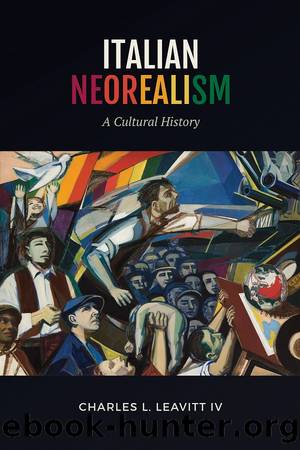Italian Neorealism by Charles L. Leavitt IV

Author:Charles L. Leavitt IV
Language: eng
Format: epub
Publisher: University of Toronto Press
a sound production, of the highest morals and at the same time appealing, one that fits within [...] the new Italian [neorealist] school, which is a credit to our film industry and much envied abroad, and which we too must value, ensuring that this formula can and does have a spiritual significance.
While Andreotti thus suggested a desire to promote neorealism, in practice his aim was to control it. He wanted films to carry an unmistakably Christian â or more accurately Christian Democrat â message, and he was prepared to exert significant financial and political pressure to make sure his goals were realized. This was already apparent in 1948, with his insistence on cinemaâs âspiritual significance,â and would become all the more apparent a few years later in a confrontation occasioned by his public opposition to Vittorio De Sicaâs 1952 film Umberto D. Andreotti chastised the director, and by implication his neorealist contemporaries, for what he saw as the failure to uphold âun qualunque principio se non di religione almeno di solidarietà umana [any standard, if not of religion, at least of human solidarity].â122 In public statements such as these, Andreotti may perhaps be said to have articulated an ethics of cinema. Yet his material interventions, as well as his private correspondence, make evident that this was all in the service of a factional and confessional politics of cinema. Indeed, in a 1949 letter to then pro-secretary of state Giovanni Battista Montini, later to become Pope Paul VI, Andreotti revealed his ambition to give confessing Catholics âun peso effettivo, nellâarte e nellâindustria dello spettacolo [an effective weight in art and in the entertainment industry],â stipulating the need to âconquistare al cristianesimo le attività dello spettacolo in Italia [... e] formare e lanciare uomini ed iniziative chiaramente nostri o almeno indubbiamente vicini [take over the film industry in Italy (... and) shape and promote men and initiatives on â or at least unquestionably close to â our side].â123 These were far from empty boasts; Andreotti had the power not just to regulate but also effectively to reshape the Italian film industry. Recognizing in the humble rhetoric of some of Italyâs most celebrated neorealist filmmakers a bid for an alternative and potentially opposing authority, he intervened to attenuate their influence.
From the opposing side of the political spectrum, Palmiro Togliatti, the leader of the Italian Communist Party, acted similarly in response to the evident bid for power articulated by Elio Vittorini in the pages of Il Politecnico. Insisting that political authority be accorded to cultural innovation, and more to the point that it be accorded to cultural innovators, Vittorini was repeatedly reproved by Italyâs post-war political leadership, whose power, unlike Vittoriniâs, was effectively unmediated, and who believed that intellectual investigation and artistic exploration should respond to political direction. Beginning in 1946, Vittorini was accused, in the pages of Rinascita, the official organ of the Italian Communist Party, of âintellettualismo [intellectualism]â â intellectual arrogance, obscurantism, fecklessness â for a series of editorial decisions that failed to conform to the partyâs increasingly stringent demands.
Download
This site does not store any files on its server. We only index and link to content provided by other sites. Please contact the content providers to delete copyright contents if any and email us, we'll remove relevant links or contents immediately.
4 3 2 1: A Novel by Paul Auster(12375)
The handmaid's tale by Margaret Atwood(7757)
Giovanni's Room by James Baldwin(7325)
Asking the Right Questions: A Guide to Critical Thinking by M. Neil Browne & Stuart M. Keeley(5757)
Big Magic: Creative Living Beyond Fear by Elizabeth Gilbert(5754)
Ego Is the Enemy by Ryan Holiday(5413)
The Body: A Guide for Occupants by Bill Bryson(5080)
On Writing A Memoir of the Craft by Stephen King(4935)
Ken Follett - World without end by Ken Follett(4723)
Adulting by Kelly Williams Brown(4565)
Bluets by Maggie Nelson(4547)
Eat That Frog! by Brian Tracy(4525)
Guilty Pleasures by Laurell K Hamilton(4439)
The Poetry of Pablo Neruda by Pablo Neruda(4097)
Alive: The Story of the Andes Survivors by Piers Paul Read(4018)
White Noise - A Novel by Don DeLillo(4002)
Fingerprints of the Gods by Graham Hancock(3996)
The Book of Joy by Dalai Lama(3976)
The Bookshop by Penelope Fitzgerald(3844)
